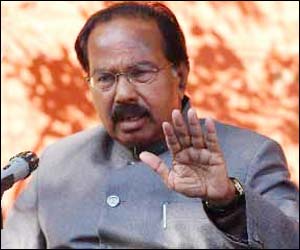 New Delhi, Feb 24: With AAP leader Arvind Kejriwal making hike in gas prices a poll issue, oil minister M Veerappa Moily has written to Prime Minister Manmohan Singh saying Reliance Industries' contract for KG-D6 gas fields cannot be terminated pending arbitration on issue of output lagging targets.
New Delhi, Feb 24: With AAP leader Arvind Kejriwal making hike in gas prices a poll issue, oil minister M Veerappa Moily has written to Prime Minister Manmohan Singh saying Reliance Industries' contract for KG-D6 gas fields cannot be terminated pending arbitration on issue of output lagging targets.
While the contract provides for termination in case of a default by a contractor, the oil ministry under S Jaipal Reddy in May 2012 had slapped penalty of $1.005 billion on RIL for failing to produce natural gas in line with the pre-stated targets.
RIL disputed the order and initiated arbitration. "In view of the contractual provision under the PSC, the government will not be able to terminate the contract on account of shortfall in production as the matter is pending before the arbitral tribunal," Moily said in his letter to the Prime Minister.
His letter came in response to charges by Kejriwal that the government was favouring RIL by nearly doubling natural gas prices from April 1, 2014.
The production sharing contract (PSC) does not have any explicit provision for penalties in case of default. A contract can only be terminated in case of a default.
Explaining the reasons behind raising natural gas prices from April, Moily said several gas fields of both RIL and state-owned Oil and Natural Gas Corp (ONGC) were economically unviable to produce at current rate of $4.2 per million British thermal unit.
"In choosing the basis for fixing the gas price, it is tempting to think that by choosing a lower price we are assuring consumers the same amount of gas supply at a lower price. The fact is that the price formula affects the investment that will be undertaken in exploration and production and therefore the total volume of gas likely to be produced," he wrote.





Comments
Add new comment